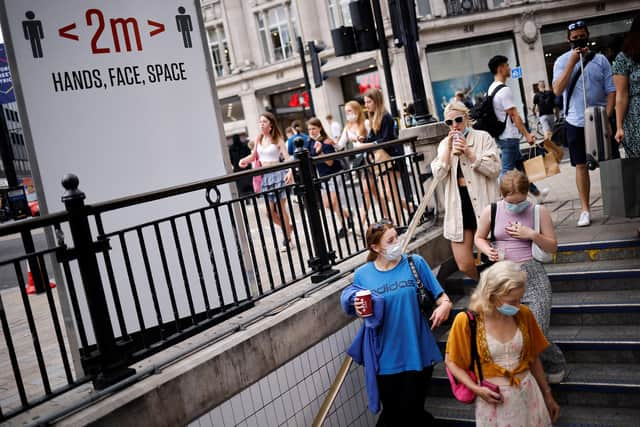What happens on 21st June? Changes to lockdown restrictions explained - and what a delay will mean for the UK
This article contains affiliate links. We may earn a small commission on items purchased through this article, but that does not affect our editorial judgement.
and live on Freeview channel 276
The final stage of the lockdown roadmap in England is quickly approaching, with all remaining restrictions due to be lifted on 21 June.
The UK government hopes to remove “all legal limits on social contact” from this fourth and final stage, but the ending of rules now looks in doubt.
Advertisement
Hide AdAdvertisement
Hide AdScientists have warned the rapidly spreading Delta Covid variant, which originated in India, risks a “substantial” third wave in the UK if it is allowed to spread unchecked.


We want to hear from you: let us know what you think about this story and be part of the debate in our comments section below
The variant now accounts for 96 per cent of new coronavirus cases and is up to 60 per cent more transmissible than the Alpha variant, first identified in Kent last year.
Covid-19 cases and hospital admissions are now on the rise across the country, with the North West of England currently recording the highest coronavirus rates.
What restrictions are due to change on 21 June?
Advertisement
Hide AdAdvertisement
Hide AdIf the lifting of restrictions in England on 21 June goes ahead as planned, all legal limits on social contact will be removed.
This will mean the following changes will take effect:
- No limit on how many people can meet in a group, either indoors or outdoors
- No social limits on the number of people attending sports events, pubs and indoor entertainment venues, including cinemas and theatres
- Nightclubs and music venues can reopen
- No limits on the number of attendees at weddings or other major life events
Advertisement
Hide AdAdvertisement
Hide AdThe lifting of restrictions on people attending large events will be subject to the results of the pilot tests the government carried out through the spring and summer, which trialled the use of Covid-19 testing and other measures to cut the risk of infection.
Despite stating all restrictions will lift at the fourth stage of the lockdown roadmap, it is expected that some social distancing measures will remain in place for a longer period, while the wearing of masks may continue to be mandatory in some public places.
Is the 21 June ‘unlocking’ likely to happen?
Prime Minister Boris Johnson is due to announce the decision as to whether the easing of restrictions on 21 June can go ahead as planned at a Downing Street press conference on Monday (14 June) evening.
Downing Street has confirmed that Mr Johnson will make the announcement at 6pm, and will be joined by England’s chief medical officer, Professor Chris Whitty, and the government’s chief scientific adviser, Sir Patrick Vallance.
Advertisement
Hide AdAdvertisement
Hide AdIt is expected that Mr Johnson will impose a month-long delay to the lifting of restrictions in England, with the end date due to be pushed back by four weeks to 19 July.
The BBC reported on Monday that the decision has been signed off by senior ministers.
What will a delay mean for restrictions?
The postponement will mean that social limits on numbers for sports events, pubs and cinemas will likely remain in place, nightclubs will be forced to remain closed, and people will continue to be encouraged to keep social distancing and working from home.
Members of the public are expected to be asked to show patience, with the delay being the final push to ensure that when restrictions finally do end, it will be “irreversible”.
Advertisement
Hide AdAdvertisement
Hide AdThe decision to proceed with each stage of the roadmap is dependent on four different tests. This includes if:
- the vaccine deployment programme continues successfully
- evidence shows vaccines are sufficiently effective in reducing hospitalisations and deaths in those vaccinated
- infection rates do not risk a surge in hospitalisations which would put unsustainable pressure on the NHS
- assessment of the risks is not fundamentally changed by new variants of concern
Advertisement
Hide AdAdvertisement
Hide AdEngland’s rate of new cases of Covid-19 has now climbed to its highest level for more than three months, with around one in 10 local areas now recording rates above 100 cases per 100,000 people.
The rise in case rates and hospital numbers, largely driven by the spread of the Delta variant, is likely to have persuaded ministers of the benefits of postponing the last stage of lifting lockdown.
A message from the editor:
Thank you for reading. NationalWorld is a new national news brand, produced by a team of journalists, editors, video producers and designers who live and work across the UK. Find out more about who’s who in the team, and our editorial values. We want to start a community among our readers, so please follow us on Facebook, Twitter and Instagram, and keep the conversation going.
Comment Guidelines
National World encourages reader discussion on our stories. User feedback, insights and back-and-forth exchanges add a rich layer of context to reporting. Please review our Community Guidelines before commenting.